- Home
- Mollie Cox Bryan
Scrapbook of Secrets
Scrapbook of Secrets Read online
SCRAPBOOK of SECRETS
Mollie Cox Bryan
KENSINGTON PUBLISHING CORP.
http://www.kensingtonbooks.com
All copyrighted material within is Attributor Protected.
Table of Contents
Title Page
Dedication
Acknowledgments
Chapter 1
Chapter 2
Chapter 3
Chapter 4
Chapter 5
Chapter 6
Chapter 7
Chapter 8
Chapter 9
Chapter 10
Chapter 11
Chapter 12
Chapter 13
Chapter 14
Chapter 15
Chapter 16
Chapter 17
Chapter 18
Chapter 19
Chapter 20
Chapter 21
Chapter 22
Chapter 23
Chapter 24
Chapter 25
Chapter 26
Chapter 27
Chapter 28
Chapter 29
Chapter 30
Chapter 31
Chapter 32
Chapter 33
Chapter 34
Chapter 35
Chapter 36
Chapter 37
Chapter 38
Chapter 39
Chapter 40
Chapter 41
Chapter 42
Chapter 43
Chapter 44
Chapter 45
Chapter 46
Chapter 47
Chapter 48
Chapter 49
Chapter 50
Glossary of Basic Scrapbooking Terms
Scrapbook Essentials for the Beginner
Advice on Cropping
Ideas for Making Your Own Gift Scrapbooks
Frugal Scrapbooking Tips
SCRAPBOOK OF SHADOWS!
Copyright Page
Dedicated to my daughters, Emma Aine and Tess Mathilde, and my nieces, Carly Richanne, Abbey Lee, and Andi Rebecca. May you always know the pleasure, comfort, and strength of good friends.
Acknowledgments
When my children were toddlers, a group of scrapbooking women reached out to me. Though our lives are not in the same place now—our children and professional lives going in differing directions—I still think of them and the time we shared with great fondness. So I’d like to thank them here, first, as they were the inspiration for this series of books. They are: Jennifer Ledford, Debbie Powdrell, Paige Edwards, Mary Thomas, Susan Horn, and Denise Thornton.
As these women can attest, I’ve been thinking about this story for a long time. So when National Novel Writing Month came along in 2009, I decided to write it down and take the challenge of writing a fifty-thousand-word novel in thirty days. Another group of individuals—my NaNoWriMo partners—spurred me on when I thought I could not write one more word. Thanks to Kate Antea, Steve Whitaker, and Mary Sproles Martin.
Speaking of spurring me on, I’d like to thank Sharon Bowers, my agent, for her steadfast belief in my fiction writing. And thanks to my culinary agent, Angela Miller, who pointed me in Sharon’s direction.
Much gratitude to editor Martin Biro and the Kensington team for taking a chance on me. I’m so proud to be a part of Kensington.
Thanks also goes to friends who read the manuscript at various stages: Jennifer Feller, India Drummond, and Leeyanne Moore. I’d also shout out to friends who supported me in other ways—whether it was watching my girls so I could get some work done, or just being there to deal with my writerly angst. Gratitude goes to Marijean Jaggers , Christy Majors, Karen Pickering, Kristie Cross, Chrissy Lantz, Cortney Skinner, Matthew and Deena Warner, Brooke Sollis, Kelley Wood, Robin Bryan, Kevin Reid Shirley, Monica Bhide, and Paula D’Allessandris.
Special thanks to a group of generous and supportive writers who have advised and encouraged me along the way: Emilie Richards, Clare O’Donohue, JoAnna Campbell Slan, Meredith Cole, Therese Walsh, Elizabeth Massie, Alison Hart, Inman Majors, and Marie Bostwick.
Last but not least, I’d like to thank my family—my mom, dad, and sister, Becky, who have had to put up with my stories since the day I could talk; my daughters, Emma and Tess, who still think I’m the coolest mom in town, even though I spend way too much time in front of the computer; and Eric, my husband of twenty years and the love of my life.
Thanks to you all.
Chapter 1
For Vera, all of the day’s madness began when she saw the knife handle poking out of her mother’s neck. Her mother didn’t seem to know it. In fact, she was surprised that the blade was inside her. “How did that happen?” she demanded to know from her daughter.
Vera just looked at her calmly. “Well, now, Mother, we need to call someone, an ambulance ... a doctor... . I don’t know. Should we pull it out, or what?”
If Vera only had a nickel for every time her mother gave her that look. A look of unbelieving pity, as if to say, Sometimes I can’t believe the stupidity of my grown daughter. Having a brilliant mother was not easy—ever—especially not as an adult. As a child, Vera assumed all grown-ups were as smart as her mother, and it was easy to acquiesce to her in all of her grown-up, brilliant, scientific knowledge. At the age of eighty, Beatrice showed no signs of slowness in her mind or any forgetfulness. Nothing. Vera almost looked forward to the day she could help her mother remember something or even tell her something that she didn’t know.
As she sat in the X-ray waiting area, looking out the window over a construction site, with a huge dilapidated barn in the distance, she marveled once again at her mother’s strength and tenacity. Evidently, she was stabbed during her travels through the town this Saturday morning. She didn’t feel a thing—and with three grocery bags in her hands, Beatrice walked four blocks home, the same path she’d traveled for fifty years. “Four different grocery stores have been there and have gone out of business,” Beatrice would say. “Yet, I’m still here, walking the same street, the same path. I refuse to die.”
Beatrice would not allow her daughter—or anyone—to pick up groceries for her or take her shopping. She said that as long as she could keep getting herself to the grocery store, she knew she was fine. Food is life. “It’s the ancient food-foraging impulse in me. I feel it even stronger, the older I get. I want to take care of myself.”
How could a woman who still fended for herself every day—cooking, gardening, canning, cleaning, and writing—not feel a knife jab into her neck?
“Vera?” said a man in medical garb who stood in front of her.
“Yes,” she said, standing up.
“I’m Dr. Hansen. We’ve just X-rayed your mom and looked over the film,” he said, smiling, revealing two deep dimples and a beautiful set of teeth. He held the film in his hands. “Would you like to see them?”
She followed him over to the wall, where he clicked on a light and clipped on the X-ray to it.
“As you can see, the knife is pretty deep.” He pointed to the blade. His nails and hands were the cleanest Vera had ever seen on a man. An overall well-manicured appearance.
“Y-yes,” she stammered. That was a knife in her mother’s neck. A knife. Long and sharp. Menacing.
“Here’s the thing, rather than give you a bunch of medical mumbo jumbo, I’m just going to put this in lay terms.”
She despised his patronizing tone. He wasn’t even born yet when her father was practicing medicine out of their home. She knew about the human body. She was a dancer; her father was a physician. Her mother might be old, but she was no slouch.
“The reason your mom didn’t feel this is because it’s lodged in an area where there are few nerve endings, whi
ch is a blessing because she is not really in any pain,” he said, taking a breath. “You just don’t see this every day.”
“No,” Vera said.
“We can pull it out, using local anesthesia, with great risk for potential blood loss and so on. If she flinches or moves while we’re removing it, the damage could be severe. We can also operate to remove it, put her under, which I think is the safest thing.”
Vera looked at him for some guidance or answer. Damn it, Bill is out of town. “Have you talked to her about it?”
“Well, yes... .”
“And?”
“She doesn’t want surgery. She wants us to pull it out.”
“So what’s the problem? It’s her body. I can’t make decisions like that for her.”
“Your mom is eighty years old and we’re not sure she’s thinking clearly. And the danger—”
“Doctor,” Vera said, trying not to roar. She felt an odd tightening in her guts. She stood up straighter. “My mother’s mind is perfectly fine. It’s her neck that seems to be the problem right now, and the fact that a knife is sticking out of it.”
He looked away. “Vera, I know this might be hard for you. A lot of times we don’t see the truth when it comes to our aging parents.”
“What exactly are you talking about? I am very close with my mom and would know if something was wrong. I don’t understand.”
“Well, she’s been talking to herself, for one thing.”
Vera laughed. “No, she’s not. She’s talking to my dad. He died about twenty years ago. She talks to him all the time.”
He looked at her as if she had lost her mind. “Do you think that’s normal?”
“For her, it is.”
Vera’s mind wandered as the doctor was called away. He said he’d be back. She looked at the crisp blue hospital walls, with beautiful landscape paintings, all strategically placed. One was above the leather sofa so you could lie or sit in style to await the news about your loved ones and gaze into the peaceful garden gazebo landscape; one was above the chair; the hallways were lined with them. Vera saw herself walking down the hall and looking at the same prints twenty years ago. Tranquil settings of barns and flowers did not help the pain. She was only twenty-one then, and she thought she’d soon be back in New York City. As soon as her father healed, got home, and was on the road to being himself, she’d hop on the train to continue her dancing career. She had no idea she’d never see her father again—nor would she ever dance professionally again.
The last time Vera was here was with her father. The hospital had just opened, and he was impressed with the technology and the vibrant pulse of new medicine. The research arm intrigued him. Some older doctors were jaded and looked at the new hospital with suspicion, but not her father. Ironic that he died here, under the new establishment’s care.
She sighed a deep and heavy sigh.
“Vera!” It was Sheila running up the hall, wiry brown hair needing combing. She was dressed in a mismatched sweat suit. “Oh, girl! What on earth is going on? I’ve been hearing rumors. Is your mama okay? Lord!”
For the first time that day, Vera smiled. “Sit down, Sheila. You’re a mess.”
Sheila took a quick look at herself and laughed. “You know, I just threw anything on. Is your mother—”
“She’s fine,” said Vera. “She’s trying to tell the doctors what to do.”
“Really?” Sheila sat up a little straighter, looking very serious. “I can hardly believe that,” she said, and a laugh escaped. Then she grabbed her belly and howled in a fit of laughter.
Vera felt tears coming to her eyes through her own chortles. “You haven’t heard the best part,” she managed to say, trying to calm herself down as a nurse passed by, glancing at them. “Mama was stabbed and she never felt a thing.”
“What?” Sheila stopped laughing for a minute. “Are you serious?” Her face reddened and laugher escaped. “Oh, girl, only Beatrice. Only Beatrice.”
Vera’s mother had just been stabbed, and she and her best friend were laughing about it, like schoolgirls unable to control their nervous giggles. A part of Vera felt like she was betraying her mother. However, she knew if Beatrice had been in this room, she’d be laughing, too.
When the women calmed down, Sheila brought up Maggie Rae, which was the other startling news of the day. “Did you hear the news?”
Vera sighed. “Yes, I heard about it. I saw the ambulances and police at her house and went over to see what was happening. You know, I blame myself. I knew something was wrong. I just didn’t know what to do about it, or maybe I just tried to talk myself out of it.”
Vera thought about the tiny young mother, always with her children clinging to her, and with a baby on her hip—or in a stroller. She was pretty in a simple way—never made-up, always pulled her long black hair into a ponytail and wore glasses most of the time. Though once or twice, Vera had seen her wearing contacts, which really opened up her face. Even though Maggie Rae rarely made eye contact, she always held herself erect and moved with a graceful confidence and sway in her hips.
“Now, Vera,” said Sheila, “you hardly knew that woman. Who really knew her? She kept to herself.”
“She brought Grace in for dance lessons once a week,” Vera told her. “I know her as well as any of the rest of them. Except she was awfully quiet. And so small. Like a bird. Every time I saw her, it looked like she had gotten even thinner.”
“Hmm-hmm, I know. It’s odd. She was one of my best customers, but she never came to a crop,” said Sheila, who sold scrapbooking supplies for a living. “I invited her. She never came, so I just ... stopped. You know, you can only push so far. ”
They sat in their own silence, with the hospital noise all around them, each knowing her own sadness and her own triumphs and joys, but neither knowing what it was like to be pushed quite that far. To be pushed far enough to put a gun to one’s heart while the children were peacefully sleeping upstairs. What kind of darkness led Maggie Rae Dasher to that moment? And what do people ever really know about the neighbors and townsfolk who live among them?
“Did she leave a note or anything?” Vera wondered out loud.
Sheila shrugged.
A nurse dressed all in blue passed them; a mother carrying a baby in a carrier and holding the hand of a toddler limped along; someone was coughing and another person laughed. A man in a wheelchair wheeled by them, while another gentleman hobbled with a cane. Phones were ringing. Announcements were being made, doctors were paged.
“Damn,” said Sheila. “This place sucks.”
“Wonder where the doctor is?” Vera looked around.
“I’m going over to that desk to see what’s going on. I should at least be able to see Mama.”
As Vera walked around the nurses’ station to try to find some help, she thought she could hear her mother’s voice.
“What?” the voice said. “Listen, you twit, you’ll do it because I said you will. Stop treating me like I am five. I am eighty, of sound mind and body, except for this friggin’ knife hanging out of my neck. And oh, by the way, I am a doctor of physics myself. So don’t tell me—”
“Mama,” Vera interrupted as she walked into the room. Sitting up in bed, her mother looked so small, which belied the sound of her voice and the redness of her face. “Calm down, sweetie.”
She folded her arms over her chest. “Son of a bitch!” She cocked her head and looked behind Vera. “What’s the scrapbook queen doing here? Am I dying or something?”
“Hey,” Sheila said. “You’ve got a knife sticking out of the back of your neck. Don’t get too cocky, old woman.”
“Huh!” Beatrice said, and smiled. “Glad to see you, too. Now, Vera, what are we going to do about this mess?”
“I told the doctor that it’s your body. You do what you want, Mama.”
“Yes, but,” she said, after taking a sip of water, leaning forward on the pillows that were propping her in an awkward position, which forced her to sit
up so the knife would not hit the bed, “what do you think? What would you do?”
Vera could hardly believe what she was hearing. Her mother was asking for her advice. She couldn’t remember if that had happened before. “Honestly, if it were me, I’d want to be put out. I’d be afraid of moving, you know?”
“I don’t know about being operated on at my age.... You know they killed your daddy. What if they kill me, too? I can’t leave yet. I’ve got too much work to do, and then there’s you. I can’t leave you without a parent,” she said quietly.
Vera knew that’s what it would come to—this is where he died, not for his heart problems, but from a staph infection.
“Just do what she asks,” Vera said to the young doctor, who was still hovering. “She won’t move.”
Chapter 2
I saw your local newspaper is hiring. They ran an ad on the Web. They say the “bar is high.” Jeez, do you think you could do it? (GRIN)—Yolonda
The bar is as high as my relatively low-slung ass. Even so, I think the job is a night job and I am half dead by then. I know you don’t understand, but running around after two little boys all day long is a killer on your nightlife—even a working nightlife.
C’mon. I’ve worked with you. I know what you can do.
It’s different. I promise. Back then, I did get breaks and even slept the whole night through.... But guess what, after a year of being here, I am actually starting to get invited to parties. Tupperware. Mary Kay. And oh, yeah, there’s the scrapbook party, which I am actually looking forward to.
WHAT? My eco-feminist, radical-poet friend is going to a scrapbook party? The Annie I knew would have rather carved her initials into her skin with a sharp blade than sit through one of those things. (In fact, so would I.)
That’s before I found out the truth.
The truth?
Yep. This town is run by scrapbookers. They are the women who run everything—the music and dance schools, the public schools, the churches, government. Everything. And they all have one thing in common. They crop till they drop.

 No Charm Intended
No Charm Intended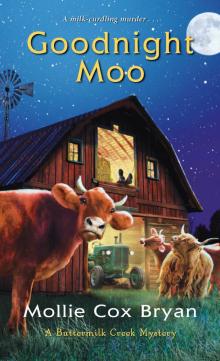 Goodnight Moo
Goodnight Moo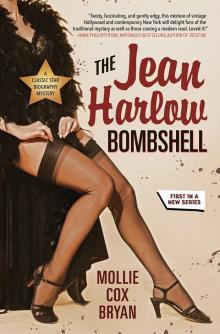 The Jean Harlow Bombshell
The Jean Harlow Bombshell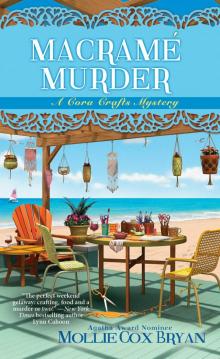 Macramé Murder
Macramé Murder A Crafty Christmas
A Crafty Christmas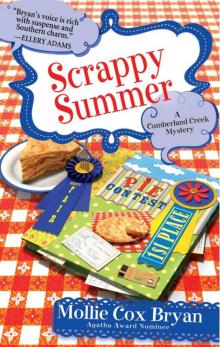 Scrappy Summer
Scrappy Summer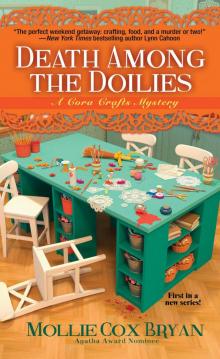 Death Among the Doilies
Death Among the Doilies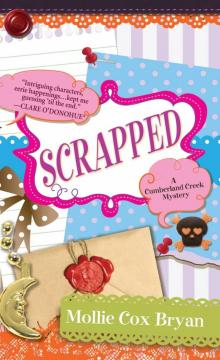 Scrapped
Scrapped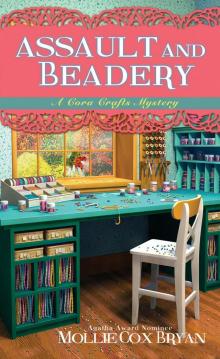 Assault and Beadery
Assault and Beadery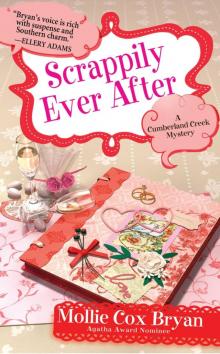 Scrappily Ever After
Scrappily Ever After Scrapbook of Secrets
Scrapbook of Secrets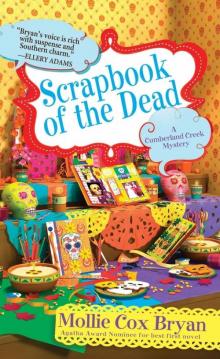 Scrapbook of the Dead
Scrapbook of the Dead